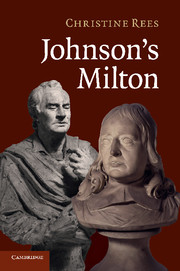Book contents
- Frontmatter
- Contents
- Acknowledgements
- List of abbreviations
- Introduction: Johnson and Milton
- PART I JOHNSON THE READER/WRITER: APPROPRIATING MILTON'S TEXTS
- 1 Summoning Milton's ghost: Miltonic allusion in the periodical essays
- 2 ‘No Miltonian Fire’? Miltonic allusion in Johnson's poetry
- 3 Rasselas: a rewriting of Paradise Lost?
- 4 ‘Licence they mean when they cry liberty’: the 1770s tracts
- PART II JOHNSON THE CRITIC: ASSESSING MILTON'S ACHIEVEMENT
- PART III JOHNSON THE BIOGRAPHER: CONSTRUCTING MILTON'S CHARACTER
- Notes
- Select bibliography
- Index
1 - Summoning Milton's ghost: Miltonic allusion in the periodical essays
Published online by Cambridge University Press: 05 October 2010
- Frontmatter
- Contents
- Acknowledgements
- List of abbreviations
- Introduction: Johnson and Milton
- PART I JOHNSON THE READER/WRITER: APPROPRIATING MILTON'S TEXTS
- 1 Summoning Milton's ghost: Miltonic allusion in the periodical essays
- 2 ‘No Miltonian Fire’? Miltonic allusion in Johnson's poetry
- 3 Rasselas: a rewriting of Paradise Lost?
- 4 ‘Licence they mean when they cry liberty’: the 1770s tracts
- PART II JOHNSON THE CRITIC: ASSESSING MILTON'S ACHIEVEMENT
- PART III JOHNSON THE BIOGRAPHER: CONSTRUCTING MILTON'S CHARACTER
- Notes
- Select bibliography
- Index
Summary
When Johnson was writing the Rambler essays between 1750 and 1752, he had reached that stage of middle life at which Milton, a century previously, was writing in defence of regicide. The gulf between their literary careers and commitments could scarcely seem wider than at this point. Yet for each of them the flexing of their rhetorical muscles in prose marks very powerfully a shared humanism, a sense of the writer's responsibility in the public domain. The ‘three problems’ which Milton claimed to have addressed in his earlier pamphlets on ‘domestic liberty’ – marriage, education, and ‘the existence of freedom to express oneself’ – are ones that also preoccupy Johnson in the work of his maturity. Both are trained to argue, believing that argument in print is fundamental to public discourse. However greatly they diverge in their political principles, they agree on the moral seriousness of what they are doing, and on the writer's duty to communicate truth as he perceives it. Even if Milton's prose might be rejected as a model (though not entirely, as we shall see), for Johnson, whether he likes it or not, the fact that Milton's poetry is so deeply embedded in his own reading experience and in that of his contemporaries turns Milton himself into an inescapable author/authority figure. In addition, his work on the Dictionary during the same period saturates his verbal memory with Milton's poetic language.
- Type
- Chapter
- Information
- Johnson's Milton , pp. 7 - 30Publisher: Cambridge University PressPrint publication year: 2010



